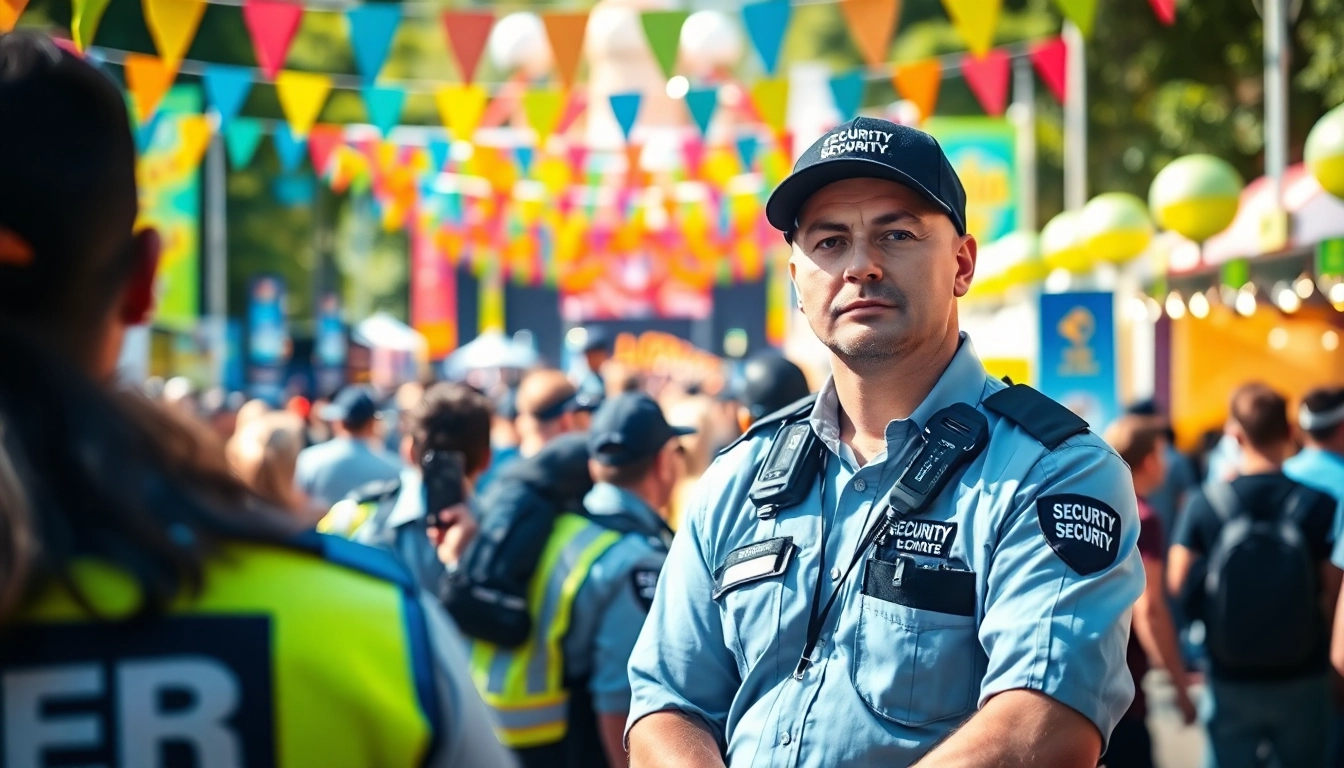Understanding the Importance of Event Security
In today’s world, events, whether corporate gatherings, social parties, or large-scale festivals, demand rigorous planning and execution—especially when it comes to safety and security. Ensuring a secure environment not only safeguards attendees but also enhances the overall experience of the event. Effective Event Security is crucial for maintaining order, preventing disruptions, and addressing potential threats. Understanding the importance of event security starts with recognizing its multifaceted nature as it encompasses a range of strategies, personnel, and technologies working in tandem to create a safe atmosphere.
What is Event Security?
Event security refers to the comprehensive measures taken to protect attendees, staff, and property during events. This can include risk assessments, crowd management, access control, surveillance, and emergency planning, among other practices. It is a coordinated effort that involves multiple stakeholders, such as security personnel, law enforcement, event planners, and venue owners, to ensure that every aspect of an event is prepared for potential risks.
The Role of Security in Events
Security plays several key roles during events:
- Deterrence: Visible security personnel can deter potential illicit activities, increasing the sense of safety among attendees.
- Access Control: Managing entry points helps regulate who can attend, ensuring that only authorized personnel and guests enter the venue.
- Crowd Management: Effective crowd control techniques maintain order and prevent overcrowding, which can lead to safety hazards.
- Emergency Response: Rapid and effective response protocols protect life and property in the event of an emergency.
Common Threats and Risks in Events
Events often face a variety of threats and risks that can compromise safety, including:
- Violence: Altercations can occur, particularly in crowded settings, making preventive measures essential.
- Terrorism: Targeted attacks can happen at large public gatherings, necessitating vigilance and preparedness.
- Health Concerns: Epidemics or pandemics can affect mass gatherings; health security has become an integral part of event planning.
- Property Damage: Vandalism or theft can lead to significant losses, emphasizing the need for effective surveillance systems.
Planning Your Event Security Strategy
Strategic planning is the backbone of effective event security management. It begins with a comprehensive assessment of potential security needs relevant to the specific event type.
Assessing Security Needs for Different Events
The security requirements for an intimate corporate seminar will differ greatly from those of a large outdoor music festival. As such, each event should be evaluated based on size, location, stakeholders involved, and past incident history. Consider the following factors:
- Event Size: Larger events typically require more robust security measures, including additional personnel and resources.
- Type of Event: High-profile events, such as celebrity appearances or political rallies, may necessitate heightened security due to the increased public interest.
- Location: Urban venues may carry different risks compared to rural spaces, impacting the planning and presence of security personnel.
- Attendee Profile: The demographic of attendees can influence the anticipated security risks. For example, events geared toward certain age groups may demand specific strategies.
Creating a Comprehensive Security Plan
A well-structured security plan includes detailed procedures and protocols that address potential risks. Essential elements of a comprehensive security plan may consist of the following:
- Site Assessment: Conduct a thorough evaluation of the venue to identify potential vulnerabilities.
- Personnel Deployment: Detail the number and type of security staff needed, including roles like crowd managers and access controllers.
- Emergency Protocols: Outline specific measures to take in various scenarios, such as fire evacuations or medical emergencies.
- Communication Strategy: Establish clear communication channels among all security team members and with emergency services.
Choosing the Right Security Personnel
The effectiveness of event security largely depends on the capabilities of the personnel assigned to the task. Key considerations for selecting the right security team might include:
- Training and Experience: Personnel should be trained in conflict resolution, crowd control, and emergency response.
- Professional Demeanor: Security staff should be approachable and maintain a calm presence, which can de-escalate potential incidents.
- Specialty Skills: For certain events, specialized skills like medical training or knowledge of local laws may be beneficial.
Implementing Effective Security Measures
Once a security plan is developed, it’s crucial to implement measures that ensure its success. This involves deploying personnel, use of technology, and preparation for emergencies.
Crowd Control Tactics
Crowd control is vital, particularly at large-scale events. Effective tactics may include:
- Physical Barriers: Utilizing barriers can prevent crowd surges and guide attendees through safe pathways.
- Security Zones: Designate specific areas for attendees, staff, and emergency personnel to prevent congestion.
- Real-time Monitoring: Utilizing surveillance technology to monitor crowd behavior can facilitate timely interventions when necessary.
Emergency Response Protocols
Aggressive preparedness for emergencies is essential. To develop functional emergency response protocols, consider:
- Clear Procedures: Define step-by-step procedures for various emergencies, ensuring all security personnel are trained accordingly.
- Evacuation Drills: Conduct regular drills to familiarize everyone with emergency procedures and escape routes.
- Medical Support: Ensure medical personnel are present and that quick access to emergency services is established.
Utilizing Technology in Event Security
Technology can significantly enhance event security. Some ways to integrate technology include:
- CCTV Surveillance: Implement closed-circuit television systems to provide real-time monitoring and recorded footage for after-event analysis.
- Access Control Systems: Use electronic ticketing or ID scanning to manage entry effectively.
- Mobile Apps: Developing an event-specific app can allow attendees to report issues and receive real-time alerts regarding safety measures.
Best Practices for Event Security Management
Successful management of security throughout the event lifecycle involves ongoing commitment and strategic action. Here are best practices to consider:
Training Staff for Emergency Situations
Preparation is key to managing emergencies effectively. Ensure that all staff and security personnel undergo comprehensive training that includes:
- Simulation Drills: Regular simulation exercises for various emergency scenarios can keep response skills sharp.
- Continuous Education: Keep security personnel updated on latest safety protocols and regulations.
- Role-Playing Scenarios: Train staff in conflict resolution and crowd management techniques through role-playing exercises.
Establishing Communication Channels
Effective communication is vital for real-time decision-making. Establishing robust communication channels can include:
- Two-way Radios: Equip security staff with reliable communication devices that allow for instant interactions.
- Incident Reporting Systems: Create standardized procedures for reporting security incidents immediately.
- Emergency Alerts: Set up a system to broadcast urgent alerts to attendees in cases of emergencies.
Conducting Security Checks Before Events
Pre-event security checks are crucial for ensuring readiness. Key actions may include:
- Site Inspections: Conducting thorough walkthroughs of the venue to identify any potential security vulnerabilities.
- Equipment Checks: Ensure that all security technology, such as surveillance cameras and alarms, are functioning properly.
- Coordination Meetings: Holding meetings with all team members to confirm roles and responsibilities for the event.
Evaluating the Success of Your Event Security
Post-event evaluation is essential for assessing the efficacy of security measures and improving future planning. This evaluation should be based on defined objectives and feedback.
Key Performance Indicators for Event Security
When evaluating security’s effectiveness, consider the following key performance indicators (KPIs):
- Incident Rate: Monitor the number of reported incidents during the event compared to previous gatherings.
- Response Time: Measure the average time taken to respond to various incidents and emergencies.
- Attendee Satisfaction: Gather feedback on attendees’ perceptions of safety and security during the event.
Collecting Feedback from Attendees
Gathering and analyzing feedback from attendees can provide invaluable insights into how security measures are perceived. Implement strategies such as:
- Post-Event Surveys: Use surveys to gather detailed feedback regarding attendees’ comfort levels and perceptions of safety.
- Focus Groups: Conduct discussions with volunteer attendees to dive deeper into security experiences and concerns.
- Social Media Monitoring: Analyze social media feedback to capture a wider audience’s sentiments regarding security and safety.
Improving Future Security Based on Insights
To continuously enhance event security, it’s important to utilize insights gained from evaluations. Consider these strategies:
- Adjust Security Plans: Modify plans based on attendee feedback and incident analysis to better address potential challenges.
- Ongoing Training: Adjust training programs for security personnel based on identified areas of improvement.
- Engage Stakeholders: Work closely with all stakeholders involved in planning future events to ensure comprehensive security considerations are made.



